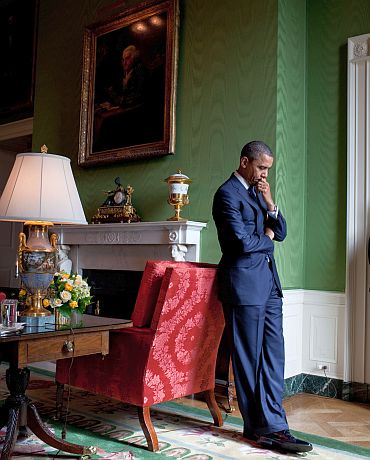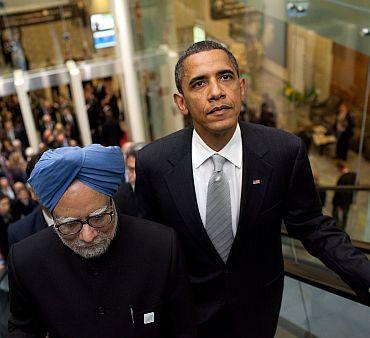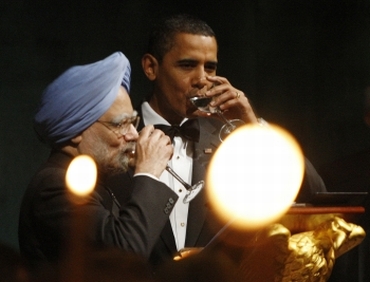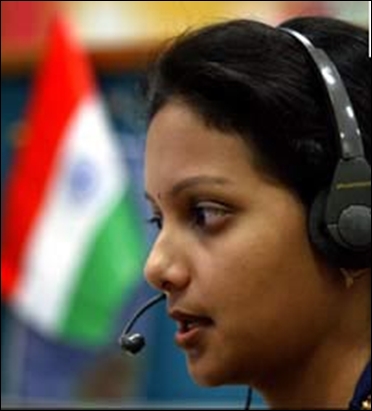
Among those who addressed the White House press corps were Press Secretary Robert Gibbs, Under Secretary of State for Political Affairs Williams Burns, Deputy National Security Adviser for International Economic Affairs Mike Froman and Deputy National Security Advisor for Strategic Communication Ben Rhodes.
Froman: This really is one of the most important emerging economic relationships for the United States, both multilaterally and bilaterally.
We worked very closely with India in the context of the G20, and the G20 was really all about bringing countries like India to the table on economic -- on global economic issues. And we have a very strong and growing bilateral relationship.
As you all know, with 1.2 billion people and an economy growing -- expected to grow at 8 percent a year for the next several years, we really see India as a potentially very important market for US exports.
US goods exports have already quadrupled over the last seven years to about $17 billion. And service exports have tripled to about $10 billion a year.
So it's a fast-growing economic relationship. And it's a two-way street as well.
Indian companies are the second-fastest-growing investors in the United States. And they are creating -- they now support about 57,000 jobs here in the US.
So it's a great market for US exports. It's a good place -- source of investment for the United States. There are a lot of jobs in the United States tied to both of those things.
You said they're second. What's first?
FROMAN: I believe it's UAE -- in terms of fastest-growing in the United States, I believe it's UAE.
That day in Mumbai, the President will meet with various groups of business people, a group of Indian entrepreneurs who are importing US technology and applying them to the Indian marketplace, and a group of US CEOs, major CEOs, who will have a dialogue with the President about doing business in India and what can be done to expand it.
He'll then give a speech to the US-India Business Council -- CII/FICCI business summit in Mumbai -- and talk about the economic relationship and the potential that it has.
One quick thing about the business leaders. Are they there as part of the President's delegation? Is he convening them? Are they part of the communication on the American side?
FROMAN: There's no official business delegation with the US. They are there in their own capacity.
There will be a meeting in Delhi of something called the US/India CEO Forum, which are a group of CEOs from the US and India who get together regularly and work on projects to strengthen economic cooperation. And some of those CEOs belong to that forum as well.
And could you also just talk a little bit about -- how big a part of the President's message is going to be devoted to opening markets, and do you expect actual takeaways, or is this just discussion?
FROMAN: I think certainly that first day, the major focus of that day, in addition to the counterterrorism event and the visit to the Gandhi Museum -- but the major focus of that day will be his message on economics, on increasing exports, supporting jobs back here, and including highlighting some commercial deals that we hope to have consummated by that time.

FROMAN: I think one of the major themes, I think, that the President is likely to emphasise is that while that is part of the relationship, India is also a tremendous market, potential market, for US exports and a source of investment back in the US.
And so it's more than a unidimensional relationship and it's a tremendous opportunity for goods, services, agriculture that he'll be pursuing while he's there for supporting jobs back here in the US.
...quantify it?
FROMAN: The opportunity?
The relationship, the difference -- if there's a trade imbalance of it there's a job imbalance at all.
FROMAN: The trade relationship is broadly balanced, including goods and services -- is broadly balanced at the moment.
Just to briefly follow on that, I wonder how will he deal from a communications standpoint with the concern that many Americans express that so many jobs are being outsourced to India -- that when you call a credit card company or an airline, the phone is picked up by somebody in India?
Will he acknowledge and address that in any way?
GIBBS: Look, India is in many ways fundamental to his economic message and has been for many years.
I think, as Mike said, we are -- and I think we'll see as we get closer -- not just the genuine potential of the market for American companies, but some tangible impact in supporting and creating jobs here in America.
RHODES: Just to add to that, this is part of -- consistent with the national export initiative. I think there will be a series of things that we talk about there that the President and the administration has done to promote US exports, increase trade financing, advocate on behalf of US companies seeking to export from the US and creating jobs back here.
So he's okay with the number of times Americans pick up the phone and they get somebody in India answering their questions so long as other exports have greater access there?
GIBBS: Well, again, I think if you've been to any of our rallies in the past, say, four years, I think you've heard the President discuss changing the way our tax code is and ensuring that our taxpayers are getting a better deal.
That is not to say that given the size and the emergence of the market, that we're going to ignore opportunities for companies -- big, recognisable companies here in the United States to sell and distribute their goods in India, which creates jobs back here in America.

I mean, you talked about what the US is doing, but that issue, in particular, is he going to say, listen, I realise there are concerns out there about the imbalance caused by outsourcing?
FROMAN: I don't want to pre-empt what the President is going to say. I would simply say that a key part of the message is going to be that we want to make sure there's opportunities for US jobs, US exports. And that's a big part of his mission there.
Will the President talk about the recently passed nuclear power law, ask for changes in it? This 80-year sort of warranty --
There are reports that there are $12 billion worth of orders are being for the US. This includes $5 billion for defence and another $7 billion of commercial deals like the Boeing aircraft, which will create 50,000 to 60,000 jobs in the US alone.
How do you think it is justified to level allegations like jobs are being outsourced to India?FROMAN: I think the important thing is that there's a large potential market there; that the President and the administration are active in promoting exports to ensure that there's a level playing field there, there's open markets there, and that our exports have an opportunity to penetrate that market and support jobs back here.
...has come out with a report expressing concerns about some of the protectionist measures being taken by this administration and the Congress. How do you plan to address that concern to US-Indian companies?
FROMAN: We are the most open economy in the world by any measure, and we have nothing at all to be concerned about with regard to our practices.
You were in Copenhagen. You were aware of some of the frustrations in the negotiations both bilaterally and in the talks in general.
Do you think that the President will address any issues? And do we have any leverage or latitude given the failure of the climate change legislation on the Hill?
FROMAN: I think he and Prime Minister Singh have had a series of discussions every time they've met about issues like climate change. And I imagine they will have a discussion about it as part of their bilateral dialogue.
Clearly -- and this is another area where we work very closely with India -- whatever success there's going to be in talks like climate change or in Doha will be in part because of the US and India are working together on it.
What do you want to see from the Indians in these negotiations? Is there anything in --
FROMAN: On climate change negotiation?
in these conversation? Is there anything particularly you --
FROMAN: Together with Prime Minister Singh and other leaders, President Obama crafted the Copenhagen accord last year. And we've been working over the course of the year, including with our Indian counterparts, to try and make those more concrete and institutionalise some of the agreements that were made in Copenhagen.
Are you moving ahead with implementation of the standards that were adopted in Copenhagen?
We've got more work to do, but we're moving ahead.

Are we likely to see resolution of anything -- financial services, anything from the summit?
FROMAN: I think there's an ongoing dialogue between the two governments about outstanding trade issues, and the President, I imagine, will make clear the importance of removing barriers to US exports and US participation in their market.
But I won't get into any specifics about what we expect to reach agreement on.
The administration has obvious conflicts with China on aspects of economic policy, exports. Could you talk about how perhaps India offers any better opportunities?
Is there more openness? Is there more potential for US investment and exports there?
FROMAN: I think all I'd say is each country is different. Both are fast-growing economies.
We have a strong interest in ensuring that the fastest-growing economies in the world are open, create a level playing field for US exporters, and allow us to take advantage of that growth to support jobs back here at home.
But we have a dialogue with China. We have a dialogue with India.
Earlier in your comments (you said) that the US was going to consummate new deals while they were there. What were you referring to? New economic deals might be announced?
FROMAN: All I was saying was that there are a number of large contracts being worked on between US companies and their Indian counterparts, often times with the support of the US government in terms of our advocacy efforts or our trade finance being available.
We hope to consummate some of these deals in the run-up to the President's visits.
RHODES: There's -- in the 21st century, there's really not -- a relationship with a major emerging power like India is something that directly affects the lives of the American people.
And if you just look at what we're doing, in every way these are issues that directly impact within our borders.
So you've heard us talk a lot about the economic potential, the potential for job creation connected to exports and Indian investment in the American economy.
Counterterrorism -- the same kinds of extremist groups who have threatened India and in some instances launched attacks are connected to a broader network that threatens us.
So the counterterrorism cooperation that we have with India every day directly affects our security.
The President's key point on climate was we need to move beyond Kyoto simply because we need to bring in the United States into an international climate framework, but also countries like China and India that are the world's fastest-growing emitters.
So I think the economic message is very clear; the market potential is clear. And then in a whole broad range of issues, these are things that directly affect the American people.
Just another question on messaging. One of the lines we hear from the President on the stump now is when he's talking about the Republican tax plan, saying that it's going to cost $700 billion over 10 years and they would cut 20 percent of education funding, and India is not cutting education funding and China is not, either.
So how does he reconcile that message and then go to India and try and form this partnership and --
GIBBS: First of all, I don't think when he says it -- he's not casting aspersions on the Indians or the Chinese.
-- competition.
GIBBS: Well, I think he's -- look, go back to virtually -- well, almost every speech he's made, I think he picks -- there's a -- I think the President has made clear in these speeches we don't compete -- as he would say, kids in Chicago or kids in DC don't just compete with kids in Richmond or kids in St Louis.
They compete with kids all over the world to be among the best-educated workforce that we have available to create the types of goods and services that allow us to sell our products in India and in China and in other places.
And I think it's important -- again, the President is not casting aspersions on those governments for not cutting their education.
He is challenging us as a country to ensure that we make critical investments in what is ultimately going to be the most important thing that we're going to be involved in, and that is ensuring that we have the best, most highly educated workforce in the world that can attract the type of jobs that are likely to be created in the 21st century.
RHODES: The only thing I'd add real quick is this is a win-win economic relationship.
The kinds of -- Indian companies are investing in the American economy because of their faith in it. Similarly, the kinds of deals that are being advanced, the kinds of partnership we're building, certainly advances American economic interest and the interests of the American people in greater jobs and growth.
But it's a kind of relationship that's going to serve the interest, the economic interest of both the United States and India.
So we see it as a -- in addition to, again, what Robert said, we see this is as a win-win economic relationship.